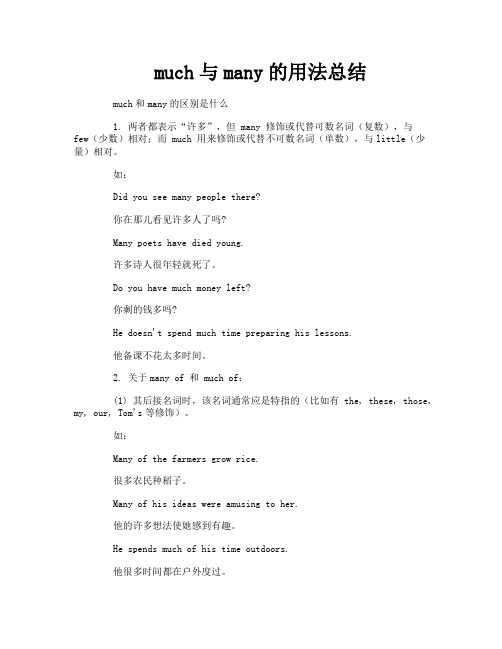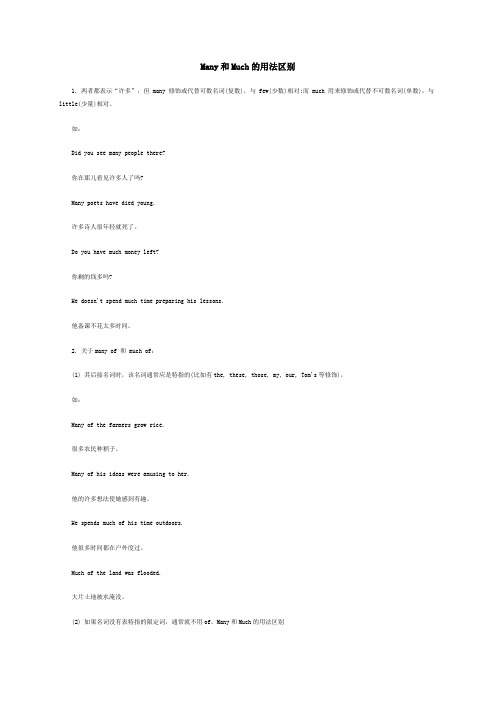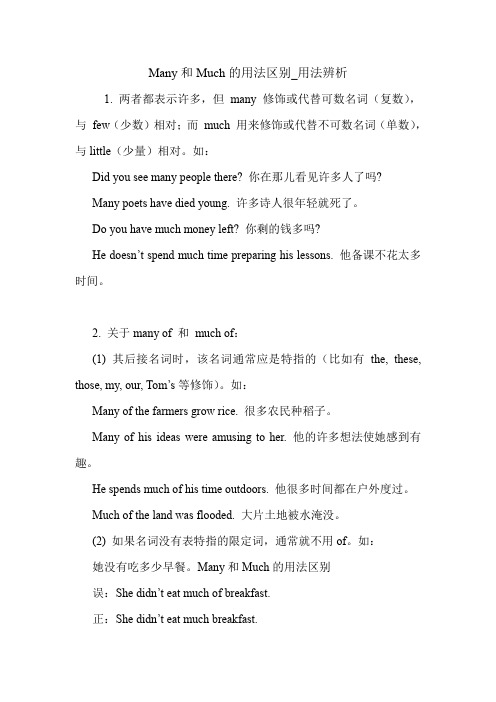much和many的用法
much与many的用法总结

much与many的用法总结much和many的区别是什么1. 两者都表示“许多”,但 many 修饰或代替可数名词(复数),与few(少数)相对;而 much 用来修饰或代替不可数名词(单数),与little(少量)相对。
如:Did you see many people there?你在那儿看见许多人了吗?Many poets have died young.许多诗人很年轻就死了。
Do you have much money left?你剩的钱多吗?He doesn't spend much time preparing his lessons.他备课不花太多时间。
2. 关于many of 和 much of:(1) 其后接名词时,该名词通常应是特指的(比如有the, these, those, my, our, Tom's等修饰)。
如:Many of the farmers grow rice.很多农民种稻子。
Many of his ideas were amusing to her.他的许多想法使她感到有趣。
He spends much of his time outdoors.他很多时间都在户外度过。
Much of the land was flooded.大片土地被水淹没。
(2) 如果名词没有表特指的限定词,通常就不用of。
Many和Much的用法区别如:误:She didn't eat much of breakfast.正:She didn't eat much breakfast.她没有吃多少早餐。
误:There aren't many of large glasses left.正:There aren't many large glasses left.大玻璃杯剩下的不多了。
(3) 如果用了介词of又没有特指限定词,通常是不可以的。
Many和Much的用法区别

Many和Much的用法区别1. 两者都表示“许多”,但 many 修饰或代替可数名词(复数),与 few(少数)相对;而 much 用来修饰或代替不可数名词(单数),与little(少量)相对。
如:Did you see many people there?你在那儿看见许多人了吗?Many poets have died young.许多诗人很年轻就死了。
Do you have much money left?你剩的钱多吗?He doesn't spend much time preparing his lessons.他备课不花太多时间。
2. 关于many of 和 much of:(1) 其后接名词时,该名词通常应是特指的(比如有the, these, those, my, our, Tom's等修饰)。
如:Many of the farmers grow rice.很多农民种稻子。
Many of his ideas were amusing to her.他的许多想法使她感到有趣。
He spends much of his time outdoors.他很多时间都在户外度过。
Much of the land was flooded.大片土地被水淹没。
(2) 如果名词没有表特指的限定词,通常就不用of。
Many和Much的用法区别如:误:She didn't eat much of breakfast.正:She didn't eat much breakfast.她没有吃多少早餐。
误:There aren't many of large glasses left.正:There aren't many large glasses left.大玻璃杯剩下的不多了。
(3) 如果用了介词of又没有特指限定词,通常是不可以的。
如:误:Many of students have read it.正:Many of the students have read it.许多学生读过它。
much和many的区别及用法

much和many的区别及用法两者都表示“许多”,但 many 修饰或代替可数名词(复数),与 few(少数)相对;而 much 用来修饰或代替不可数名词(单数),与little(少量)相对。
1. 两者都表示“许多”,但 many 修饰或代替可数名词(复数),与 few(少数)相对;而 much 用来修饰或代替不可数名词(单数),与little(少量)相对。
如:Did you see many people there?你在那儿看见许多人了吗?Many poets have died young.许多诗人很年轻就死了。
Do you have much money left?你剩的钱多吗?He doesn't spend much time preparing his lessons.他备课不花太多时间。
2. 关于many of 和 much of:1 其后接名词时,该名词通常应是特指的(比如有the, these, those, my, our, Tom's等修饰)。
如:Many of the farmers grow rice.很多农民种稻子。
Many of his ideas were amusing to her.他的许多想法使她感到有趣。
He spends much of his time outdoors.他很多时间都在户外度过。
Much of the land was flooded.大片土地被水淹没。
2 如果名词没有表特指的限定词,通常就不用of。
Many和Much的用法区别如:误:She didn't eat much of breakfast.正:She didn't eat much breakfast.她没有吃多少早餐。
误:There aren't many of large glasses left.正:There aren't many large glasses left.大玻璃杯剩下的不多了。
many和much的用法

many和much的用法: 〔1)many修饰复数可数名词,表许多;much修饰不可数名词,表量或程度。
He has many friends, but few true ones. There hasn't been much good weather recently. (2)many a: many a和many 同义,但语气比较强,并且要与单数名词及单数形动词连用。
Many a prisoner has been set free. (=Many prisoners have been set free.) 〔3〕as many和so many均等于the same number of。
前有as, like时, 只用so many。
These are not all the books I have. These are as many more upstairs. They worked like so many ants.(4)as much等于the same amount of, 表同量和同一事情。
He bought two pounds of sugar and asmuch tea. 〔同量) I was not in the least surprised, for I had fully expected as much. 〔同一事情) (5)many和much之后不接名词时,作为代名词;另外much 也可用副词。
Many of them were very tired. I don't eat much for lunch. 〔代名词) He is much taller than I. (副词) some用法及与any的区别用some 和any 填空: 1) -- Would you like something to eat? -- I’d like________ bread. 2) Don’t worry. There is________ milk in the bottle. 3) Are there__________ girls and boys in the classroom? 4)I don’t have _________ meat, but I have__________ eggs and cakes. 5) Would you like _________ apple juice? 答案:1) some 2) some 3)any 4) any; some 5) some 分析: 题1是一句肯定的答语,意为:我想要一些面包。
Many和Much的用法区别_用法辨析 英语语法.doc

Many和Much的用法区别_用法辨析1. 两者都表示许多,但many 修饰或代替可数名词(复数),与few(少数)相对;而much 用来修饰或代替不可数名词(单数),与little(少量)相对。
如:Did you see many people there? 你在那儿看见许多人了吗?Many poets have died young. 许多诗人很年轻就死了。
Do you have much money left? 你剩的钱多吗?He doesn’t spend much time preparing his lessons. 他备课不花太多时间。
2. 关于many of 和much of:(1) 其后接名词时,该名词通常应是特指的(比如有the, these, those, my, our, Tom’s等修饰)。
如:Many of the farmers grow rice. 很多农民种稻子。
Many of his ideas were amusing to her. 他的许多想法使她感到有趣。
He spends much of his time outdoors. 他很多时间都在户外度过。
Much of the land was flooded. 大片土地被水淹没。
(2) 如果名词没有表特指的限定词,通常就不用of。
如:她没有吃多少早餐。
Many和Much的用法区别误:She didn’t eat much of breakfast.正:She didn’t eat much breakfast.大玻璃杯剩下的不多了。
误:There aren’t many of large glasses left.正:There aren’t many large glasses left.(3) 如果用了介词of又没有特指限定词,通常是不可以的。
如:误:Many of students have read it.正:Many of the students have read it. 许多学生读过它。
many和much的用法

many和much的用法many和much的用法,大家知道的吗?接下来,小编给大家准备了many和much的用法,欢迎大家参考与借鉴。
many和much的用法(1)many修饰复数可数名词,表许多; much修饰不可数名词,表量或程度。
He has many friends, but few true ones.There hasn’t been much good weather recently.(2)many a: many a和many同义,但语气比较强,并且要与单数名词及单数形动词连用。
Many a prisoner1 has been set free. (=Many prisoners2 have been set free.)(3)as many和so many均等同于the same number of。
前有as, like时, 只能用so many。
These are not all the books I have. These are as many more upstairs.They worked like so many ants.(4)as much等同于the same amount of,表同量和同一事情。
He bought two pounds of sugar and as much tea. 〔同量)I was not in the least surprised, for I had fully3 expected as much. 〔同一事情)(5)many和much之后不接名词时,作为代名词;另外much也可用副词。
Many of them were very tired.I don’t eat much for lunch. 〔代名词)He is much taller than I. (副词〕扩展:表示“许多”的词组的对比分析(1) plenty of, a lot of, lots of均表“许多”,修饰复数可数名词或不可数名词。
不定代词much、many的用法总结

不定代词much、many的用法总结下面是小编整理的一些关于much、many的用法总结,希望对大家有帮助。
不定代词much、many的用法总结many(很多,可数):用法和much相同,在句子里可用作主语、宾语和定语等。
如:Many of us are from the rural areas.(主语)Before the 1950's in our factory no warker had a bicycle or sewing machine, now many have both.(主语)How many do you want?(宾语)There are many cars in the streets.(定语)【注一】:much用于不可数名词,动词用单数。
many用于可数名词,动词用复数。
如:There are not many mistakes in his exercise.Much of what he said is true.【注二】:在日常口语的肯定结构中,much和many常由a lot of或lots of代替。
如:He has put a lot of sugar in his porridge.(a lot of代替much) Our government spends a great deal of money on schools.(也可用a great deal of代替much)A lot of birds come here in the spring.(a lot of代替many)There are a large number of islands in the South Seas.(也可用a large number of代替many)much(很多,不可数):相当于名词、数词和形容词,在句中可用作主语、宾语或定语。
如:Much has been done to increase cotton output.(主语)He didn't say much, but every word was to the point.(宾语) There is not much water left in the thermos flask.(定语)【注】:much在下面例子中用作状语。
much和many的用法之欧阳育创编

Many和Much用法①many和much都作“许多”解,但many用于修饰可数名词,而much修饰不可数名词。
例如:1. China has many oil fields. 中国有许多油田。
2. In our view, there is much oil here. 在我们看来,这里有许多石油。
②代词many和名词much用法举例:1. Many of the students want to sum up the past experience before going on. 许多学生(原意为:学生中间有许多人)要总结一下过去经验在继续干。
2. Much of the waste acid is utilized. 废酸中大部分被利用了。
③“much(副词)+比较级”作“……得多”解:1. The sun is much large than the moon. 太阳比月亮大得多了。
2. This problem seems much more difficult than that one.这道题似乎比那道题难得多。
3. We turned back a much larger enemy force. 我们把力量强得多的敌人顶了回去。
④副词much修饰动词、过去分词时作“十分”解:1. We all love Beijing very much. 我们大家都非常热爱北京。
2. We are much interested in heat utilization. 我们对热量利用十分感兴趣。
注:上述两种句子,一般不能用very代替much。
有时much也可修饰作表语用的形容词:It is much the same. 差不多相同。
⑤many和much的一些常用词组:many a time 许多次how many books 多少书how much water 多少水as much (many) 同样多as much (many) as 像……那么多倍数+as much (many) as………的……倍(那么多)much less 何况(用于否定)much more 何况(用于肯定)注1:much和many的比较级和最高级都是more和most,分别详见第337页和225页。
- 1、下载文档前请自行甄别文档内容的完整性,平台不提供额外的编辑、内容补充、找答案等附加服务。
- 2、"仅部分预览"的文档,不可在线预览部分如存在完整性等问题,可反馈申请退款(可完整预览的文档不适用该条件!)。
- 3、如文档侵犯您的权益,请联系客服反馈,我们会尽快为您处理(人工客服工作时间:9:00-18:30)。
Many和Much用法
①many和much都作“许多”解,但many用于修饰可数名词,而much修饰不可数名词。
例如:
1. China has many oil fields. 中国有许多油田。
2. In our view, there is much oil here. 在我们看来,这里有许多石油。
②代词many和名词much用法举例:
1. Many of the students want to sum up the past experience before going on. 许多学生(原意为:学生中间有许多人)要总结一下过去经验在继续干。
2. Much of the waste acid is utilized. 废酸中大部分被利用了。
Many of the workers were at the meeting.
Much of the time was spent on learning.
③“much(副词)+比较级”作“……得多”解:
1. The sun is much large than the moon. 太阳比月亮大得多了。
2. This problem seems much more difficult than that one.
这道题似乎比那道题难得多。
④副词much修饰动词、过去分词时作“十分”解:
1. We all love Beijing very much. 我们大家都非常热爱北京。
注:上述两种句子,一般不能用very代替much。
⑤ many和much的一些常用词组:
many a time 许多次 how many books 多少书 how much water 多少水
as much (many) as 像……那么多
much加不可数名词,如much milk many加可数名词复数,如many apples
How many加可数名词复数,如How many pears
How much加不可数名词,如How much water
How much也可用于问价钱,如How much are the apples?意思是这些苹果多少钱?这是How many与How much的最大区别
Some和any 既可以修饰可数名词又可以修饰不可数名词,some常用在肯定句中,而any则常用在否定和疑问句中。
因此 some和any 的用法主要是考虑用在肯定句、疑问句还是否定句中,与名词的可数与否无关。
some意为“一些”,可作形容词和代词。
它常修饰可数名词复数。
如:some books一些书,some boys一些男孩,也可修饰不可数名词,如:some water一些水,some tea一些茶叶,some常用在肯定句中。
any 意为“任何一些”,它也可修饰可数名词复数或不可数名词,常用于疑问句和否定句。
如:
s
--I have some tea here. 我这儿有些茶叶。
--Do you have any friends at school? 你在学校有些朋友吗?
--I have some English books我有英语书
但在表示建议,反问,请求的疑问句中,或期望得到肯定回答时,多用some而不用any。
如: Would you like some coffee? 你要不要来点咖啡?
What about some fruit juice? 来点水果汁如何?
当any表示“任何”的意义,起强调作用时,它可以用在肯定句中;
Any student can answer this question.任何学生都可以回答这个问题。
:
辨析some和any的不同用法:some 常用在肯定句中,而any 则常用在否定和疑问句中。
在表示建议,反问,请求的疑问句中,或期望得到肯定回答时,多用some而不用any。
副词enough要放在形容词副词的后面,形容词enough放在名词前后都可。
例如:
I don't know him well enough. 他我不熟悉。
mmmmmThere is enough food for everyone to eat.有足够的食物供每个人吃。
There is food enough for everyone to eat.
a lot当然不是名词性短语了,而是副词性短语,修饰动词。
比如:Thanks a lot.= Thanks very much.
再比如:I know him a lot。
代词代词pronoun,简称pron.是代替的一种词类。
大多数代词具有名词和的功能特征及在句中的作用分为:、、、反身代词、、、、连接代词和九种。
不定代词:
没有明确指定代替任何特定名词或形容词的词叫做不定代词,常用不定代词如下:
all,any,another,both,each,every,either,few,little,many,much,no,none,neither,one,other,some以及
由some,any,no,every 和body,one,thing 构成的复合词。
不定代词的用法:
不定代词代替名词或形容词.在句中可用作主语,宾语,表语和定语。
Everybody should be here in time tomorrow.明天大家都要按时到。
I know nothing about it.这件事情我一点都不知道。
That's all I know.这就是我知道的。
不定代词的具体用法:
常见的不定代词有all,both,each,every等,以及含有some-,any-,no-等的合成代词,如anybody,something,no one。
这些不定代词大都可以代替名词和形容词,在句中作主语、宾语、表语和定语,但none和由some,any,no等构成的复合不定代词只能作主语、宾语或表语;every和no只能作定语。
如:
--- Do you have a car?--你有一辆小汽车吗?
--- Yes,I have one.--是的,我有一辆。
--- I don't know any of them.他们,我一个也不认识。
any:一些,任何。
any 多用作否定或疑问句中,any 在句中作主语,宾语,定语。
any作定语时,所修饰的名词没有单复数限制,一般多用复数,any 用在肯定句中,表示"任何"。
Do you have any books?你有书吗?
You can come any time.你什么时候都可以来。
some:一些,某些,某个。
some 多用在肯定句中,表示邀请或者对方可能给予肯定回答的疑问句中等。
There are a lot of flowers in the garden,some are white,which I like very much.
花园里有许多花,一些是白色的,我特别喜欢。
I am going to get some ink.我去弄点墨水。
Will you have some coffee,please?喝点咖啡吗?
no:无.在句中作定语.表示否定,语气要比not any 强.
She knows no English.她根本就不懂英语。
I have no bike.我就没有自行车。
None 既可以指人也可以指物,其后通常接of短语,用作主语时,若指不可数名词,谓语只能用单数,若指复数名词时,则谓语可用单数(较正式),也可以用复数(非正式语体)如:None of the milk can be used.
None of the films is/are worth seeing.
many:许多.在句中作主语,宾语,定语. many 在句中代替可数名词。
Many of the students like English very much.许多学生非常喜欢英语。
I have many books to give you.我有许多书要给你。
much:许多。
在句中作主语,宾语,定语。
much 在句中代替不可数名词。
There is not much ink in the bottle.瓶子里没多少墨水了。
a few,a little,few,little.:几个,一点儿,没几个,没多少。
它们在句中作主语,宾语,定语,其中a few 和few 代替可数名词,a little和little 代替不可数名词,它们表示少量,不多,几个,只是主观上的一种相对说法,并没有具体的数量标准。
Few of the books are cheap now.现在没几本儿书是便宜的。
A few friends came to see me yesterday.昨天有几个朋友来看我。
I have a little money to buy the book.我的这点钱能买这本书。
There is little water in the thermos.暖水瓶没多少水了。
